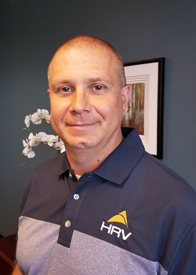 Value—organizations pursue it, measure it, recognize it, and reward it. But how do organizations achieve value? HRV achieves value through its people and the technical expertise they bring to bear on the projects they perform, and how we are enhancing our clients’ experience in their working with HRV. Getting to this measurable threshold requires a diligent pursuit of technical excellence. HRV Construction Services Project Manager Kevin Chatary understands this dynamic and is adding value to both HRV and our clients.
Value—organizations pursue it, measure it, recognize it, and reward it. But how do organizations achieve value? HRV achieves value through its people and the technical expertise they bring to bear on the projects they perform, and how we are enhancing our clients’ experience in their working with HRV. Getting to this measurable threshold requires a diligent pursuit of technical excellence. HRV Construction Services Project Manager Kevin Chatary understands this dynamic and is adding value to both HRV and our clients.
Kevin started with HRV in August 2019 after two years with a contractor as an engineer, and 11 years with PennDOT where he was involved with a broad range of technical and administrative functions.
“My time spent with PennDOT,” said Chatary, “ran the gamut of possible positions including construction management and inspection, highway maintenance management, customer service, and even snow removal—it provided me with great experience in many different facets of that organization.”
His time with PennDOT also prepped Kevin to pursue seemingly never-ending opportunities to improve himself while also adding value to an organization.
Starting as early 2006, Kevin’s impressive list of technical certifications range from NHI Stream Stability and Scour at Highway Bridges, NACE Coatings Inspector Level 1, and CMIT (Construction Manager-in-Training) to Concrete Field Testing Technician, PCI Level I, and, most recently, PCI Level II.
But this is not a resume—this is a path toward adding value though the pursuit of technical excellence.
“There’s been plenty of challenges in achieving these technical certifications,” added Chatary. “The PCI Level II, which I’ve just recently completed, was difficult in that the preparation was exhaustive and the expectations were high—very high.”
“PCI” is the acronym for “Precast/Prestressed Concrete Institute,” whose core purpose is to “provide value to members by maintaining and protecting the technical integrity of precast concrete, promoting its increased use as a high-quality construction material, and enhancing members’ businesses.” PCI-issued certifications help to fulfill the organization’s mission and many state departments of transportation not only recognize but require PCI certification for concrete used in the construction of transportation infrastructure.
Higher PCI certifications provide HRV with expertise in concrete plant QA; to ensure the plants are appropriately following their QA procedures. Most likely, however, the highest level of value to HRV is that Kevin is now an additional technical resource that can collaborate with HRV field inspectors on materials quality issues they have identified in the field.
“For me, the certification indicates that I’m technically qualified to not only perform the inspection work, but to be a ‘sounding board,’ if you will, and consult with my QA inspection peers in the field,” said Chatary. “It gives me the opportunity to increase my value to HRV by expanding my technical expertise while also increasing HRV’s value with its clients.”
His hard work toward achieving the PCI Level II certification has motivated Kevin to continue the pursuit.
“No, I’m not done yet—not by a long shot,” concluded Chatary. “My next quest is the CCM (Certified Construction Manager) certificate from CMCI (Construction Manager Certification Institute). After that, who knows—perhaps PCI Level III?”
